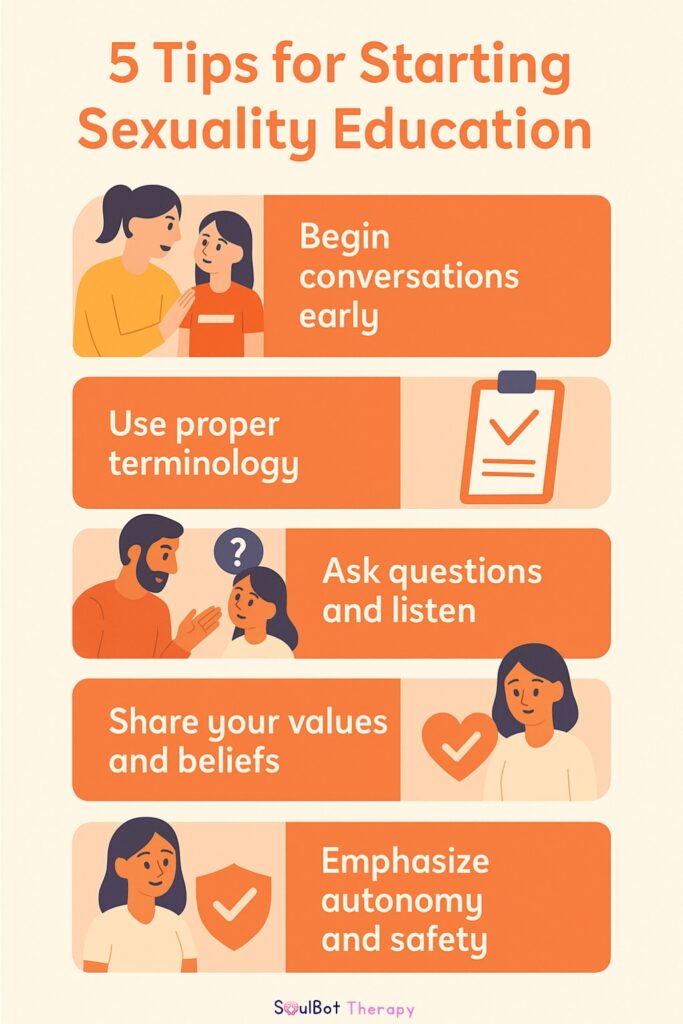Talking to your teen about sexuality education can feel intimidating. You worry about saying the wrong thing. They worry you’ll make it even more awkward. But here’s the truth:
Open, affirming conversations about sexuality can change lives.
They shape how young people view their bodies, relationships, consent, and self-worth.
If you’re wondering how to talk to teens about sexuality education in a way that feels supportive (not uncomfortable), this guide is for you.
Why Sexuality Education Matters for Teens?
Sexuality education isn’t just about biology or reproduction.
It’s about:
- Understanding emotional intimacy
- Respecting different identities and orientations
- Building healthy boundaries and consent awareness
- Normalising self-acceptance over shame
Research shows that teens who receive comprehensive sexuality education are:
- More confident about their choices
- More likely to delay sexual activity
- Less vulnerable to coercion or unsafe behaviours
- More inclusive toward LGBTQ+ peers
“Sexuality education teaches teens how to be safe — and how to be seen.”
How to Prepare for a Healthy Conversation?
Before you even start talking, check your mindset.
Ask yourself:
- What are my values and biases?
- Am I open to learning along with them?
- How can I stay calm even if the conversation feels uncomfortable?
✅ Tip:
Practice “curious listening” — where your goal is understanding, not controlling.
What Teens Wish Adults Knew About Sexuality?
If teens could anonymously tell you what they need, they’d probably say:
- “Please don’t freak out if I ask something real.”
- “I want facts, not fear.”
- “It’s okay if you don’t have all the answers.”
- “Your reaction teaches me whether it’s safe to share again.”

How to Start a Healthy Conversation About Sexuality Education?
Start with openness, not interrogation. Try these conversation openers:
- “I know it wasn’t easy for adults to talk about this when I was younger. I want to do better with you.”
- “There’s so much confusing stuff online about sexuality. Want to talk about it together?”
- “You’re probably learning a lot from your friends and social media — want to chat through anything?”
✅ Keep tone curious, non-judgmental, and low-pressure.
Common Questions Teens Ask (And How to Answer Them)
| Teen Question | How to Respond |
| “How do I know my sexual orientation?” | “Sexuality can be fluid and evolving. It’s okay not to have a fixed label yet.” |
| “Is it normal to feel confused?” | “Absolutely. Exploring feelings is part of growing up — no rush or right answers.” |
| “What if my friends don’t accept me?” | “You deserve friends who accept you fully. And you always have a safe space here with me.” |
| “How do I know if a relationship is healthy?” | “Healthy relationships feel respectful, supportive, and safe — not pressured or secretive.” |
🚫 Mistakes to Avoid When Talking About Sexuality
- Making it a one-time “big talk” instead of ongoing small conversations
- Judging or invalidating emotions (“It’s just a phase!”)
- Ignoring LGBTQ+ realities (inclusive language matters)
- Over-sharing personal details (keep focus on them, not your past)
“Think less lecture, more conversation.”
📚 Best Resources for Sexuality Education (For Teens & Adults)
- UNESCO International Guidelines on Sexuality Education
- It Gets Better Project – LGBTQ+ Support for Teens
✅ Consider browsing these together with your teen!
Building Trust, One Conversation at a Time
Remember: you don’t have to be a perfect expert. You have to be present, patient, and willing to listen.
If you feel overwhelmed supporting your teen’s evolving identity, you can always reach out for guidance yourself. 💬
🧠 Book a Free Parent Consultation →
or
💬 Explore More SoulBot Resources for Emotional Wellness → here
🙋♀️ FAQ: Talking to Teens About Sexuality Education
At what age should you start talking about sexuality with kids?
Start early with age-appropriate conversations about consent, respect, and body safety, and adapt the depth as they grow.
How do I make conversations about sexuality less awkward?
Stay curious, normalise exploration, avoid judgment, and accept that a little awkwardness is better than silence.
What if my teen doesn’t want to talk about it?
- Respect their readiness.
- Offer open invitations instead of forcing conversations.
- Small moments matter more than big talks.
How can I be LGBTQ+ inclusive even if I’m still learning?
Use inclusive language (“partner” instead of “boyfriend/girlfriend”), respect pronouns, and stay open to evolving your understanding alongside them.
Final Thought: Connection Beats Perfection
- You don’t need a script.
- You need a real connection.
When you make it safe for your teen to wonder, question, and feel seen, you give them a lifelong gift: Permission to be themselves.
🌈 Share This Guide with Other Parents
or🧠 Take SoulBot’s Orientation Quiz with Your Teen → — because exploration deserves support, not shame.
🔗 Related SoulBot Reads
- How to Talk to Teens About Sexuality Education
- Am I Straight, Gay, Bi, or…? Understanding Different Sexual Orientations
- Internalized Shame: How It Affects Your Sexual Expression



